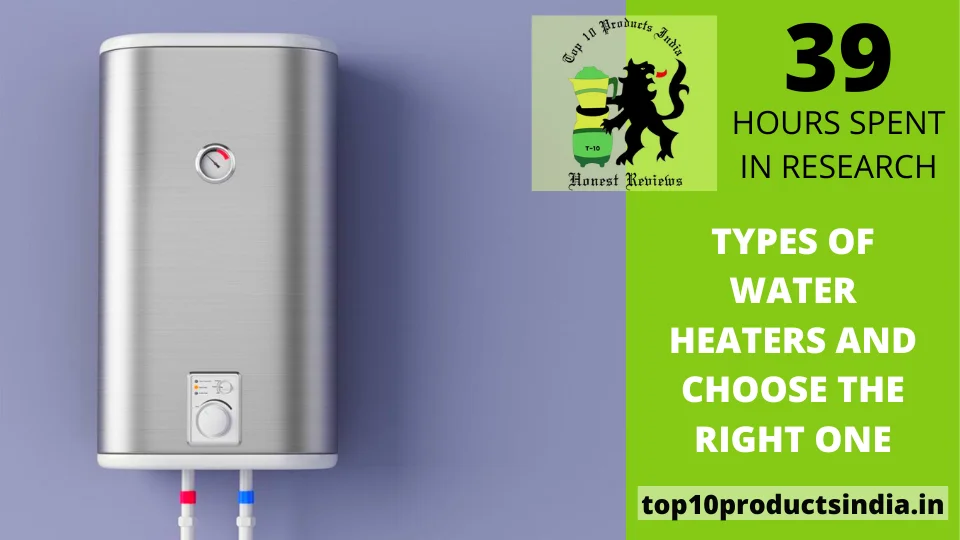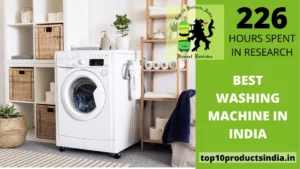Water heaters are appliances that are essential for many homes. Various water heater types are available on the market, each suitable for different needs and preferences. Tankless water heaters don’t use a storage tank to hold hot water. Instead, they create it as you need it.
They are more energy efficient than traditional tank models but tend to cost more upfront. Storage tanks can come in several sizes, with larger tanks able to store more volume of hot water while requiring longer periods to reheat after use.
Solar-powered water heaters utilize the power of the sun to create thermal energy and therefore have no fuel costs associated with them, but may also require higher initial installation costs.
Regardless of which type of water heater is chosen, one should consider whether they will purchase an electric or gas model based on their home and lifestyle needs.
Type Of Water Heater
Horizontal Geyser:
Horizontal geysers are a rare geological phenomenon caused by underground streams with high pressure that launch water in a horizontal direction. Horizontal geysers typically appear only after intense rainfall and can reach heights ranging from several feet to hundreds of feet.
Unlike ordinary geysers, which tend to be short-lived water spurts, horizontal geysers flow continuously for an extended period before gradually dissipating. The force of these powerful springs has been known to break through asphalt and displace large rocks.
These unique formations have intrigued curious onlookers since their first discovery, offering a glimpse into an incredible natural phenomenon that fascinates people worldwide today.
Instant Water heater:
Instant hot water heaters are a great way to enjoy a hot shower or bath without waiting for the water to warm up. These modern heating appliances work by instantly heating cold water as it passes through the system, allowing for nearly instantaneous hot water throughout your house.
When deciding to switch from a traditional hot water tank to an instant heater, several benefits should be considered. Instant heaters provide more efficient cost savings due to the ability to generate only the amount of hot water needed while leaving cold water in reserve; they also save space and are much quicker than relying on a tank that runs out of warm water after usage.
Ultimately, owning a quality instant hot water heater can provide amazing convenience and comfort that lasts many years.
Vertical Geysers:
Vertical geysers are a unique and fascinating natural phenomenon. Instead of erupting horizontally like a traditional geyser, vertical geysers shoot water into the air in an upright column. These water jets can reach up to 750 feet high and appear in various shapes due to the changing pressure of the underground springs.
Though they are unpredictable and often come and go without warning, these impressive earth displays captivate those lucky enough to witness them in all their glory. The most famous Vertical Geyser is the Fountain Geyser, located in Yellowstone National Park, where visitors stand in awe watching this remarkable display of nature’s power.
Gas Geysers:
Gas Geysers are a cost-effective and environmentally friendly way of heating water for a home. They are powered by natural or propane gas and supply hot water quickly and reliably, making them the perfect choice for busy households.
Unlike traditional storage geysers, gas geysers do not need to be manually refilled or heated regularly; they provide hot water when needed without electricity. Gas geysers can significantly save monthly energy bills as they use less energy than electric models while producing less carbon dioxide.
Not only that, but they typically last longer, too, due to the durability of their components. Also, installation is usually straightforward and convenient, making them ideal for those tight spaces where other appliances may not fit. All in all, investing in a gas geyser can make financial sense while also helping to reduce your household’s carbon footprint.
Solar water heaters:
Solar water heaters are an alternative energy source that heats up your home’s hot water supply. They are generally made of two parts – the storage tank and a solar energy collector – and tap into the natural energy from the sun for heating your water.
Solar water heaters are becoming increasingly popular due to their environmental sustainability, cost-effectiveness, and low maintenance. With no need for electricity or gas to make them work, you can enjoy heated water without putting a strain on your wallet or polluting our planet’s atmosphere.
Solar water heaters provide hot water all year round, making them a sensible choice for residential and commercial applications. Investing in solar water heaters is an excellent decision whether you want to save money on monthly bills or reduce your carbon footprint.
Immersion water heaters:
Immersion water heaters are perfect for quick and convenient heating needs! Immersion water heaters are a great way to heat water quickly and efficiently. They are typically long metal rods that can be submerged into nearly any water container.
In addition, these immersion heaters have built-in heating elements that generate heat to rapidly raise the temperature of the water.
This allows for hot water in just minutes, making it the perfect way to get quick and easy hot water without waiting for a traditional heater or boiler system to activate. Furthermore, they are affordable and cost-effective since they only need electricity as a power source.
How to Choose a Water Heater?
If you want to choose the right water heater for your home, there is much to consider. However, our expert team has evacuated which features, specs, and other points are the most important to consider when choosing a water heater. Follow these points and ensure the water heater or geyser you choose performs the best:
Determine the Fuel Type:
The first thing to consider when choosing a water heater is the type of fuel that will be used. The most common fuel types are electricity, natural gas, and propane. Electric heaters are easy to install and have low upfront costs. Gas heaters are more expensive up front but have lower operating costs.
Determine the Size:
The size of the water heater will depend on the number of people in your household and your hot water usage. A general rule of thumb is that a family of four will need a 40-50 gallon water heater. However, if you have a larger family or have high hot water usage, you may need a larger water heater.
Consider the Energy Efficiency:
When choosing a water heater, consider the energy efficiency of the unit. Look for water heaters with the Energy Star label, which means they meet energy efficiency guidelines set by the Environmental Protection Agency (EPA). An energy-efficient water heater can save you money on your utility bills.
Look at the Recovery Rate:
The recovery rate is the hot water the heater can produce in an hour. If you have a large family or high hot water usage, you will need a water heater with a high recovery rate.
Consider the Cost:
The cost of the water heater is an important factor to consider. Compare the upfront cost of the water heater with the long-term savings in energy costs. A more expensive, energy-efficient water heater may save you money in the long run.
FAQs
What are the different types of water heaters?
The most common types of home water heaters include tankless, gas, electric, and solar-powered water heaters. Each type has its benefits and drawbacks, so choosing the right one for your needs can be challenging.
What is a tankless water heater?
A tankless water heater is an energy-efficient option that provides hot water on demand rather than storing heated water in a tank. It only heats the amount of hot water needed when you turn on the tap, making it more cost-effective in energy consumption and operation cost over time.
Are there any special considerations when choosing an electric or gas-powered heater?
Yes, electric or gas-powered heaters should be chosen based on energy efficiency ratings as well as the size of the storage capacity required to satisfy the hot water needs of your home. Safety precautions must also be taken into account to prevent any accidental fires or other unwanted incidents caused due to incorrect installation or use.
What is a solar-powered water heater?
A solar-powered water heater uses renewable energy from sunlight to provide hot water for household needs. These systems generally require professional installation by specialized contractors, which can make them slightly more expensive compared to conventional models. Still, they have much lower running costs in the long run!
Are there any other features I should look for when purchasing a new system?
Yes, you should also look for features such as built-in temperature controls and safety features like automatic shutoff valves, which can help protect against potential hazards from excessive temperatures or fluctuations in pressure levels within your plumbing system.
Additionally, check if extended warranties are available with the purchase, as this can ensure peace of mind if anything goes wrong!
Conclusion
Tankless water heaters offer a more economical way to heat water than traditional tank-style water heaters. Tankless water heaters are smaller and use less energy but require an initial investment. Heat pump water heaters provide even greater energy savings.
They are ideal for those living in mild climates, while solar water heaters can be a great option for those who want to reduce their utility bills even further and help the environment at the same time. With all of these options available, it is easy to see why choosing a new water heater is an important decision and has far-reaching implications.











